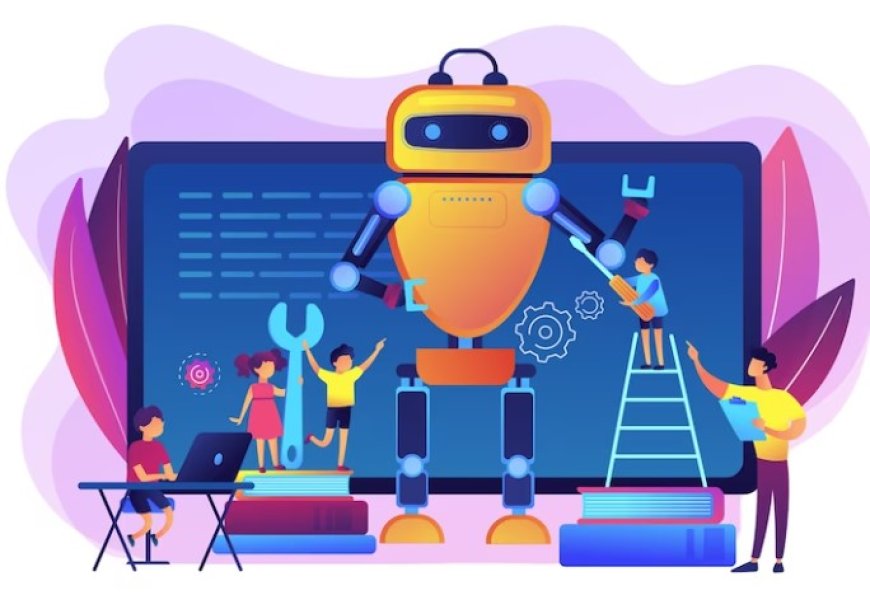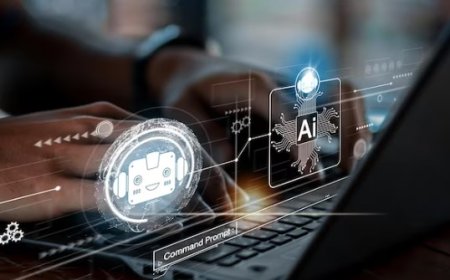Explore The Role of AI in Education
Explore AI in education, technology, learning, teaching, personalization, tools, innovation, data, analytics, classrooms, and the future.

In recent years, the integration of Artificial Intelligence (AI) into the field of education has transformed the way we learn and teach. AI technologies have the potential to personalize education, streamline administrative tasks, and provide a more engaging and interactive learning experience. This blog explores the impact of AI in education, discussing its benefits, challenges, and future implications for learners and educators.
Artificial Intelligence (AI) has become a game-changer in various industries, including education. It has completely transformed the way we teach and learn, bringing in a new era of possibilities. The integration of AI in education has sparked discussions about its potential to enhance educational experiences, meet the diverse needs of learners, and simplify administrative tasks. As educators and policymakers navigate the opportunities and challenges presented by AI, it is essential to grasp its multifaceted impact on the future of education.
Despite the promise of AI in education, its implementation is not without challenges. Privacy concerns, ethical implications, and the fear of job displacement have generated apprehension among educators and stakeholders. Moreover, the efficacy of AI in fostering critical thinking skills and emotional intelligence, which are fundamental to holistic learning, remains a subject of debate. Balancing the use of AI with the irreplaceable role of human interaction and guidance in education presents a complex dilemma that requires careful consideration and strategic planning.
The challenges associated with integrating AI into education are multifaceted and require a comprehensive approach:
-
Data Privacy and Security: The collection and storage of student data by AI systems raise concerns about privacy and security. Institutions must establish robust data protection policies to safeguard sensitive information and ensure that data is used solely for educational purposes.
-
Ethical Content Generation: AI-generated content can inadvertently promote bias, misinformation, or inappropriate material. Implementing ethical guidelines and oversight mechanisms for AI-generated content is crucial to maintaining the quality and appropriateness of educational materials.
-
Digital Divide: Not all educational institutions, especially those in underprivileged areas, have equal access to the necessary infrastructure and resources to effectively implement AI technologies. Bridging the digital divide through equitable distribution of resources and connectivity is essential for ensuring that all students have access to AI-enhanced education.
-
Pedagogical Shift: Integrating AI into education requires a fundamental shift in pedagogical practices. Educators need training and professional development to effectively utilize AI tools and adapt their teaching methods to complement AI-driven approaches.
-
Teacher and Student Preparedness: Both teachers and students must be prepared to embrace AI as an educational tool. This entails not only technical skills but also the development of critical thinking and digital literacy skills to navigate the AI-driven educational landscape effectively.
-
Inclusivity and Accessibility: It's essential to ensure that AI-driven tools and content are designed with accessibility in mind, catering to students with diverse learning needs and abilities. This promotes inclusivity and allows all students to benefit from AI-enhanced education.
-
Monitoring and Evaluation: Regular monitoring and evaluation of AI systems are necessary to assess their impact on student learning and ensure that they align with educational goals and standards. Continuous improvement and refinement of AI applications are essential to meet evolving educational needs.
-
Teacher-Student Interaction: The integration of AI, particularly in grading and assessment, should not lead to a reduction in teacher-student interaction. Maintaining a balance between automated tasks and personal feedback and guidance is crucial for the holistic development of students.
How can educators and policymakers use AI to improve the learning environment and address integration challenges in education?
AI has the potential to revolutionize education by creating a learning environment that is both inclusive and dynamic. By harnessing the power of AI, educators can cater to the individualized needs of students, ensuring that each student receives personalized attention and support. This technology can analyze vast amounts of data to identify areas where students may be struggling and provide targeted interventions to help them succeed. Additionally, AI can empower educators by providing them with comprehensive insights into student progress and performance, enabling them to deliver a curriculum that is engaging and effective.
Quizzes and Assessments: AI can efficiently generate various types of quizzes and assessments, ranging from simple knowledge-based quizzes to complex evaluations that test critical thinking and problem-solving skills. These AI-generated assessments can provide students with opportunities for self-assessment and help educators evaluate student progress more effectively.
Interactive Lessons and Modules: AI can create interactive and immersive lessons and modules that incorporate multimedia elements, interactive simulations, and virtual reality experiences. These engaging learning materials can enhance student engagement and comprehension, making the learning process more dynamic and impactful.
Adaptive Learning Resources: AI can develop adaptive learning resources that adjust content based on individual student performance and learning styles. By providing tailored educational materials, AI ensures that students receive personalized support and guidance, fostering a more effective and efficient learning experience.
Multimedia Content Production: AI can generate multimedia content, including educational videos, animations, and infographics, to present complex concepts in a visually appealing and easily understandable format. These multimedia resources can cater to different learning preferences and enhance students' retention of key information.
Curriculum Customization: AI can assist in the customization of educational curriculum by analyzing student performance data and identifying areas where curriculum adjustments are needed. This data-driven approach enables educators to tailor educational content to meet the specific needs and learning goals of individual students or groups of students.
Textbook and Study Material Generation: AI can aid in the creation of textbooks and study materials by generating relevant and up-to-date content on various academic subjects. This not only facilitates the accessibility of quality educational resources but also enables educators to focus on delivering interactive and application-oriented classroom experiences.
Real-time Content Updates: AI can ensure that educational content remains current and relevant by continuously updating materials to reflect the latest advancements and developments in the respective fields. This feature enables students to access the most recent information, ensuring that their learning experiences align with the latest industry standards and best practices.
To summarize, AI continues to revolutionize the education sector, stakeholders must proactively embrace its potential while proactively addressing the associated challenges. By leveraging AI's capabilities to personalize learning experiences, streamline administrative tasks, and promote critical thinking skills, the education landscape can become more inclusive and effective.
It is crucial to prioritize bridging the digital divide by ensuring equitable access to AI-driven educational resources and technology. Simultaneously, ethical implementation practices must be upheld, emphasizing data privacy and security to build trust among students, educators, and parents.
Collaborative efforts between educators and policymakers are essential to develop a balanced approach that seamlessly integrates AI into the education system. This approach should prioritize the cultivation of digital literacy skills alongside traditional academic knowledge, preparing students to thrive in the digital age. Through this holistic integration, the education sector can adapt to the evolving technological landscape and foster a dynamic learning environment that equips students with the skills and knowledge necessary for success in the 21st century.




































